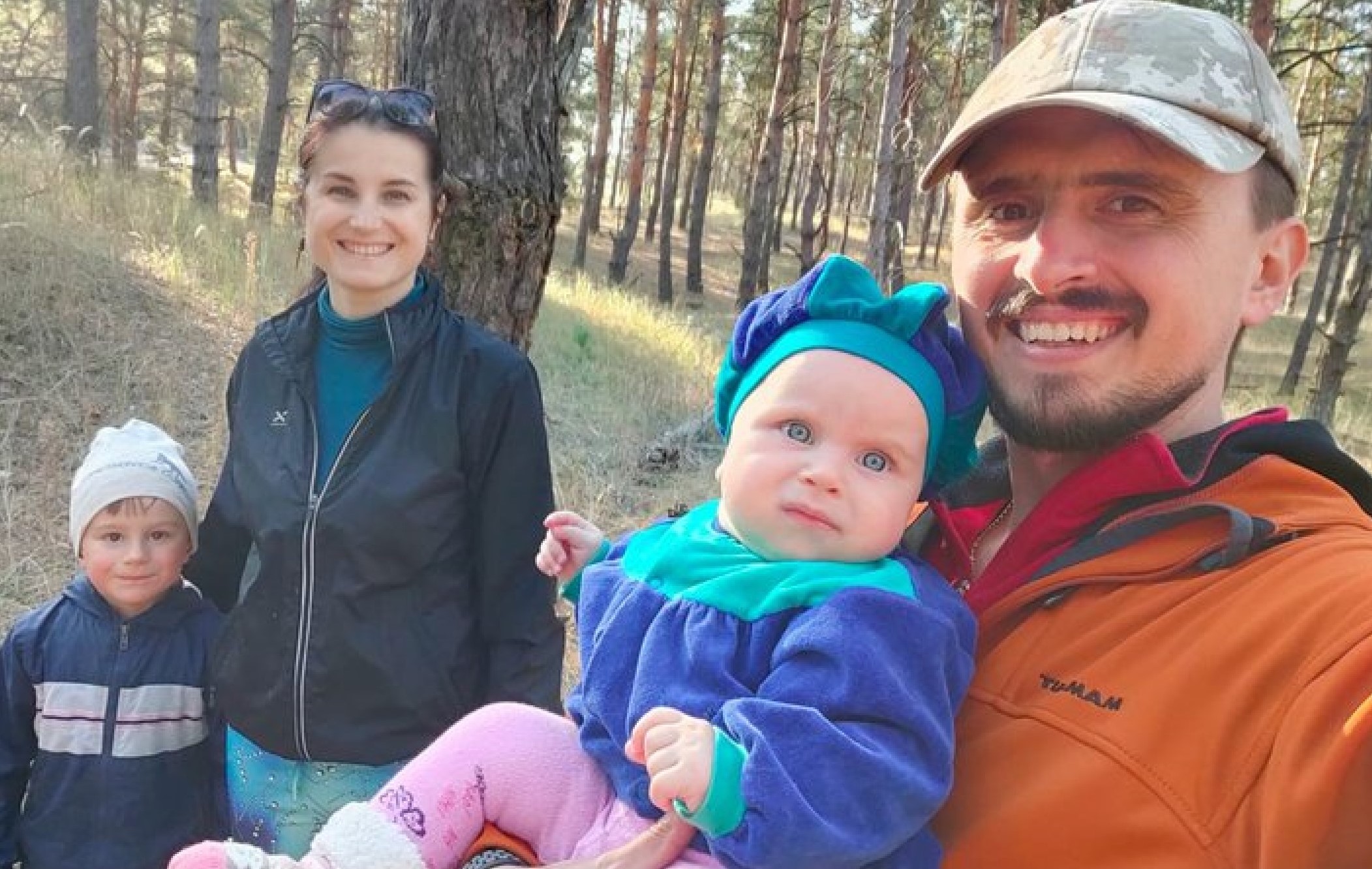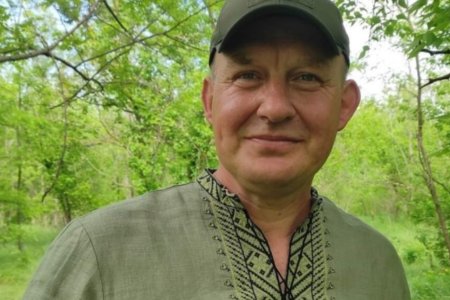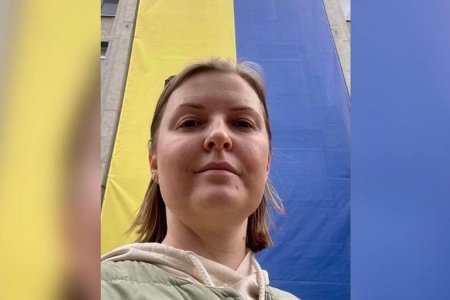
A Russian occupation ‘court’ has sentenced 35-year-old Ivan Kozlov to 11 years’ imprisonment on mystery ‘spying’ charges, after holding him prisoner for almost two years. He was originally accused of opposing Russia’s war of aggression against Ukraine, with Maria Kozlova threatened that she would be imprisoned also, and their children sent to an orphanage if she did not tell them about her husband’s non-existent activities.
Kozlov was seized by the Russians on 21 April 2022, as he and Maria tried to get their small children out of occupied Kherson. Their only route was via occupied Crimea, and it was at the Russian checkpoint just outside Armiansk that Kozlov was taken prisoner, without any explanation given. There essentially remains no explanation, only 18 months in captivity and, recently, an 11-year sentence on secret ‘spying’ charges.
The Russian invading forces seized control of Kherson on 2 March 2022, and it remained under occupation until 11 November that year. Russian terror began immediately, with a huge number of civilians abducted, tortured and held captive, with some dying in Russian captivity.
Maria Kozlova explains that she and her husband decided to leave with their two small children on 21 April and head, via occupied Crimea into Russia in order to cross into Georgia. Russia’s full-scale invasion was underway, and there was essentially no other way to get out of the occupied city.
The coach on which they were travelling stopped at the Russian checkpoint, with all the men taken away for ‘interrogation’. Ivan was also taken away by the armed Russians but he did not return. Three hours later, he called his wife and told her to come and collect their things. He said that he would explain, but, when she arrived, she was approached by Russians brandishing machine guns who simply handed her their belongings. in response to her questions about Ivan, they said only that ‘an additional check’ was underway.
The coach driver advised Maria to travel on with them, since she was with small children (4-year-old son and infant daughter) and it was dangerous to remain at the checkpoint which was swarming with Russian military
The following morning, she and the children arrived in Nalchik (near the Caucasus Mountains). There the Russians took them off the coach, taking away all telephones and documents. She was taken for interrogation by the FSB, again, without any explanation. They were held there for over 24 hours, with Maria grilled about all details of her life and the family, about what Ivan had been doing since the Russian invasion. Maria was directly pressured and threatened that if she did not “confess, and tell them what Ivan had been doing”, they would put her in prison and send the children to an orphanage.
She continued to insist that the couple had merely been seeking to get the children as far as possible from the war. The FSB were clearly convinced since, the following day, she and the children were put in another vehicle heading from Kherson to Georgia. That was, however, to make no difference to Ivan’s fate. Once seized, he remained in captivity and was, eventually accused of ‘spying’. A search was carried out of their apartment in occupied Kherson, with the invaders taking away Kozlov’s computer hard drive, as well as any other technology not removed earlier.
Ivan was later shown on a Russian propaganda channel being taken from a cell and forced to stand, half-bent, with his hands pressed against the wall. On the same video, they showed a so-called ‘interrogation’, in which Ivan said that he had coordinated shelling of Russian equipment at Chornobaiivka in Kherson oblast. Kozlov’s face was blurred on the video, but Maria says that she recognized both her husband’s voice and the distinctive orange jacket that her husband had on him when abducted.
Any such apparent ‘confessions’ are provided by men held by the Russians totally incommunicado and are undoubtedly extracted through torture. We know from those former hostages, POWs or political prisoners who have later been released that they are told what to say, or even forced to learn their lines off by heart or face renewed electric shocks or beatings.
It is now known that Kozlov was first held in SIZO [remand prison] No. 1 in occupied Simferopol. Then in October 2022 he was moved to SIZO No. 2, which is one of two remand prisons that Russia has opened in occupied Crimea since its full-scale invasion of Ukraine, in large measure to hold the huge number of civilians abducted from occupied parts of Kherson and Zaporizhzhia oblasts.
Initially Ivan was accused of the incredible ‘resistance to what is euphemistically referred to as the ‘special military operation’, i.e. Russia’s full-scale invasion of Ukraine. Russia is holding many Ukrainian civilians hostage, accusing them only of such entirely reasonable opposition to the invading forces and not bringing any identifiable charges. This is a particularly dangerous position as such hostages have no procedural status and Russia prevents any contact with lawyers or relatives.
In Kozlov’s case, the Russians did at first deny that he was held at SIZO No. 1, and attempts by Maria’s now deceased mother, who was living in occupied Kerch, to get parcels and letters to Ivan were fruitless.
It was only later that the Russians confirmed that Kozlov was imprisoned, and then, in February 2023, charged him with ‘spying’ under Article 276 of Russia’s criminal code (which Russia is applying, in violation of international law, on occupied territory). It was, seemingly, after this that the Russians posted his almost certainly torture-induced ‘confession’.
It was after the charges were laid that Kozlov was allocated a state-appointed lawyer who provided Maria with scant details about the charges. ‘Spying’ charges are a favourite for Russia’s security service [FSB] as entire ‘trials’ can be held behind closed doors and even independent lawyers (whom the ‘investigators’ resort to all methods, including torture, to try to prevent) are forced, under threat of criminal prosecution, to sign a non-disclosure agreement.
Kozlov was initially held in solitary confinement but was later moved to a cell with other men. Maria has learned that the men are prevented from even doing any exercise and are very badly treated. At least Maria is about to organize parcels for him and communicate through letters. From a practical point of view, the parcels are of critical importance as the conditions in any Russian or Russian-controlled prison are appalling. All Ukrainian prisoners of war and the few civilian hostages whom Russia has released in exchanges of prisoners have returned to Ukraine in terrible condition, and often very thin.
The contact is, of course, vital for moral support. Maria says that her husband sends his children fairy tales that he writes himself, and she sends him letters, including those from his friends. He is trying to learn English in captivity and is able to read the books his wife and friends send (however the weight of monthly parcels is strictly limited).
It is important because of another method by which the Russians tortured Kozlov. For the first year of his imprisonment, he had no idea what had happened to his wife and children, with the Russians claiming to him, as they had threatened his wife, that Maria had also been imprisoned and the children sent to an orphanage.
Although the ‘case’ against Kozlov was in three volumes, there was no actual evidence to back the charges. The only ‘witness’, namely the FSB officer who is supposed to have detained him was not even called to testify in court. Maria says that the whole process seemed like a conveyor belt.
She believes that the charge of having directed Ukrainian fire against Russian technology at Chornobaiivka was probably based on something they found on his phone. However, according to the coordinates that it was claimed he had passed on, the Russians had not lost any technology or personnel, making the charges even more absurd.
Kozlov’s ‘trial’ was over in just three hearings, with the 11-year sentence handed down on 30 December 2023. Although the hearings were in occupied Crimea, the sentence was passed by three ‘judges’ from an occupation ‘court’ in Henichesk (Kherson oblast). Two of the ‘judges’ – Svetlana Kuraeva and Airat Galyamov – are Russian. The third was Viktor Mozhelyansky, a Ukrainian traitor who has been notorious for his part in political ‘trials’ in occupied Crimea since soon after Russia’s invasion in 2014.
Maria plans to lodge an appeal on her husband’s behalf, however these are political charges issued by illegitimate ‘courts’, and are, unfortunately, extremely unlikely to succeed.
Based on interviews which Maria Kozlova has given to Hromadske Radio, Media Initiative for Human Rights and the ZMINA Human Rights Centre


